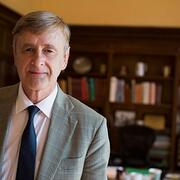
David Hempton made these remarks following Harvard President Drew Faust's introduction of him as the next Dean of Harvard Divinity School at a reception at HDS on March 30, 2012.
My thanks to President Faust for this very generous introduction. It's a great honor to be asked to lead the Divinity School, Harvard's second oldest professional school, founded almost 200 years ago. I also wish to thank Bill Graham for a decade of remarkably dedicated leadership, which has left the School in such a strong position. I must also thank our distinguished visitors and guests who partner with us so faithfully and sacrificially. We deeply appreciate what you do for us and for our students. Thank you for your support.
I want to say just a few words based around three concentric circles: the Divinity School, the wider University, and the wider world.
First, the Divinity School.
I am not normally a huge fan of mission statements, which often set high standards of sheer banality, but we have an unusually good one:
'Drawing on its historical strength in Christian studies and its significant resources in global religious studies, Harvard Divinity School educates scholars, teachers, ministers, and other professionals for leadership and service, both nationally and internationally. To help in building a world in which people can live and work together across religious and cultural divides, we strive to be a primary resource in religious and theological studies for the academy, for religious communities, and in the public sphere.'
I like these six dialectical pairs of ideas:
Historic roots in Christian studies, but also growing expertise in world religions
Educating for leadership and service
Aspiring to both national and international influence
Bringing together religious and theological studies
Serving the academy and religious communities in the wider world
And finally, building bridges across religious and cultural divides
To accomplish this we already have a remarkably talented community of students, staff, and faculty, but there is scope for us to build an even stronger intellectual culture and an even greater commitment to engage with the important religious questions of our time.
Second, the University.
HDS already has terrific master's and doctoral programs, and we contribute a large number of courses on religion to the undergraduate program. But we also know that, given Harvard's extraordinary resources, we can build an even stronger undergraduate program in religion. We all need to put our minds to this.
We also know that we need to relate more self-confidently with other schools throughout the University. For good and ill, religion connects with and informs so many other aspects of world civilization, and we have expertise to bring to these issues.
Finally, the wider world.
I want to leave you with three linked challenges to think about today:
My colleague at Boston University, Peter Berger, perhaps America's most distinguished sociologist of religion, has stated recently that secularization, far from being an inexorable product of modernity throughout the world, is more or less confined to Western and Central Europe and what he calls "an international cultural elite." In the rest of the world vibrant religious cultures are the default position, not the exception. I see this gap between secularized cultural elites and global religious traditions as potentially one of the most dangerous things in our world. The consequences need to be thought about, especially since research universities like ours recruit most of our faculty and students from Berger's secularized minorities. We need to know about this gap, how it works, and what its consequences are.
Second, in a recent book, Stephen Prothero has stated that "The United States is one of the most religious places on earth, but it is also a nation of shocking religious illiteracy"—even among college students. We have already paid a heavy price for this ignorance, and we dare not let it go unattended. We have serious work to do at Harvard and beyond to improve religious literacy in this country and in the wider world.
Finally, a flashback to Northern Ireland in 1969-70. That was the year I went up to Queen's University Belfast as a young undergraduate. I was a typical child of the 1960s, more interested in sport, music, and girls than understanding the religious and political dynamics of my own culture. All hell broke loose in Northern Ireland in those years, with hundreds of people a year dying in violent incidents in the early 1970s. Like Steve Prothero's religious illiterates, I really didn't know what was going on. I should have. I vowed I would find out. That's why I’m standing here today. Religious illiteracy matters; we ignore it at our peril. Let's take it on.